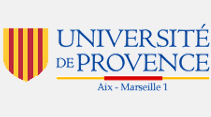University of Provence
 | |
| Type | Public |
|---|---|
| Active | 22 May 1969–January 1 2012 |
| President | Jean-Paul Caverni |
Academic staff | 1,527[1] |
| Students | 23,056[2] |
| Undergraduates | 12,807[2] |
| Postgraduates | 7,948[2] |
| 1,297[2] | |
| Location | , |
| Website | http://www.univ-provence.fr/ (in French) |

The University of Provence Aix-Marseille I was a public university mostly located in Aix-en-Provence and Marseille. It was one of the three Universities of Aix-Marseille and was part of the Academy of Aix and Marseille. On 1st January 2012 it merged with the University of the Mediterranean and Paul Cézanne University to become Aix-Marseille University, the youngest, but also the largest in terms of students, budgets and staff in France.
Overview
The University was established in 1969, through a merger of the school of humanities in Aix-en-Provence and the science one in Marseille.[4] "The University of Provence is one of the most distinguished in France, second only to the University of Paris in the areas of French literature, history, and linguistics", according to Harvard University website.[5]
In the academic year of 2007-2008, 23,056 students were enrolled.[2] Among them, 15,158 were female, while only 7,898 were male.[2] 3,255 students came from countries outside of France, 44 per cent of these came from Africa.[2] 15,109 students studied in Aix-en-Provence, while others went to Marseille, Avignon, Digne, Lambesc, Arles and Aubagne.[2] Overall, its facilities span 258 143 m².[3]
In 2007, the budget was 120,7 million euros, with 39,2 million euros available after wages.[6]
It has its own university press, Publications de l'Université de Provence.[7] It also has its own theater, the Théâtre Antoine Vitez, named for Antoine Vitez.[8][9][10][11][12]
Departments
- Ancient Civilisations
- Anthropology
- Applied Linguistics
- Arabic, Berber languages, Persian, Turkish, Yiddish, Hebrew
- Art History and Archeology
- Biology
- Chemistry and Physics
- Cognitive Psychology
- Developing and Differential Psychology
- Drama
- English
- Environmental Studies
- Ergology
- French
- Film Studies
- Geography and Urban Planning
- German
- Hellenism
- Hispanic and Latin American Studies
- History
- Information Technology
- Italian
- Korean
- Linguistics
- Mathematics, Computer Science and Mechanics
- Media Studies
- Miscellaneous Languages (Armenian, Hindi and Japanese)
- Music
- Philosophy
- Phonetics and French as a Foreign Language
- Portuguese
- Psychology and Psychopathology
- Romanian
- Slavic Languages (Russian, Bulgarian, Polish, Serbian, Croatian, Bosnian, Czech)
- Sociology
- Teaching Studies
- Visual Arts
Notable faculty and alumni
- Georges Duby taught at the University of Provence.[13]
- Mansour Mohamed El-Kikhia: Libyan politician and member of the interim National Transitional Council (NTC).
- Sadaf Foroughi and Kiarash Anvari are graduates of the film studies department.
- Gilles-Gaston Granger taught there from 1964 to 1986.
- Prof. Dr. John H. Hubbard taught at the University of Provence.
- 2008 Nobel Prize laureate in literature J.M.G. Le Clézio earned a master's degree with a thesis on Henri Michaux from the University of Provence in 1964.[14]
- Paul Veyne taught at the University of Provence in the 1960s.<ref>Colloquium
- Hugh D. MacPhie: Author of Don’t Forget Your Cape! What Preschoolers Teach Us About Leadership and Life. Sigma Chi Iota Mu Chapter Alumnus
References
- ^ a b Official website, indicators, staff
- ^ a b c d e f g h Official website, indicators, students
- ^ a b Official website, indicators, sites
- ^ Campus France
- ^ STUDY ABROAD FOR CONCENTRATORS IN LITERATURE - Harvard University
- ^ Official website, indicators, budget
- ^ Official website
- ^ Theatre website
- ^ University webpage
- ^ Yahoo webpage
- ^ Claudie Sage, Olivia Ferrandino, Maxime Dray, David Gressot, Petit Futé Aix en provence, pays Aixois et Salonais, Nouvelles Editions de l'Université, 2010, p. 98 [1]
- ^ Dominique Auzias, Jean-Paul Labourdette, Aix-en-Provence 2012, Petit Futé, 2012, p. 129 [2]
- ^ Danièle Iancu-Agou, L'Expulsion des Juifs de Provence et de l'Europe Méditerranéenne (XVe-XVIe siècles): Exils et Conversions, Peeters Publishers, 2005, p. xv [3]
- ^ Marshall, Bill; Cristina Johnston. France and the Americas. ABC-CLIO, 2005. ISBN 1-85109-411-3. p.697
External links
- Template:Fr icon Official Website of the University of Provence Aix-Marseille I
- Télé Campus Provence
